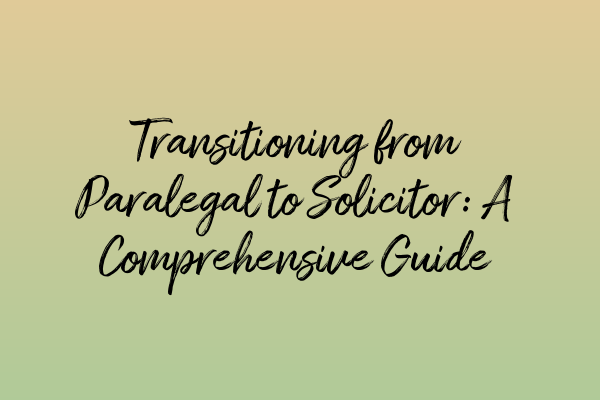Transitioning from Paralegal to Solicitor: A Comprehensive Guide
Are you a paralegal aspiring to become a solicitor? Transitioning from a paralegal to a solicitor is an exciting and challenging journey that requires careful planning and preparation. In this comprehensive guide, we will walk you through the steps you need to take to make a successful transition, from gaining the necessary qualifications to navigating the application process.
1. Decide on the Legal Practice Area:
Firstly, it is important to decide on the legal practice area you wish to specialize in as a solicitor. Whether it’s corporate law, criminal law, family law, or any other field, having a clear focus will help you tailor your training and gain the relevant experience.
2. Meet the Academic Requirements:
To become a solicitor in the UK, you need to have a qualifying law degree or a non-law degree followed by a conversion course such as the Graduate Diploma in Law (GDL). Ensure that you meet the academic requirements set by the Solicitors Regulation Authority (SRA).
3. Complete the Legal Practice Course (LPC):
The next step is to enroll in and successfully complete the Legal Practice Course (LPC). This vocational course provides practical training and knowledge necessary to work as a solicitor. During the LPC, you will cover areas such as client care, legal research, and professional conduct.
4. Secure a Training Contract:
One of the key requirements to qualify as a solicitor is to complete a two-year period of structured on-the-job training known as a training contract. This is a valuable opportunity to gain hands-on experience and apply the legal knowledge you have acquired. It is essential to secure a training contract with a law firm or an organization that is authorized to provide training.
5. Study and Pass the Professional Skills Course (PSC):
While undertaking your training contract, you will also need to complete the Professional Skills Course (PSC). This course focuses on developing the essential skills required for legal practice, including advocacy, communication, and negotiation skills.
6. Demonstrate Competence and Ethics:
Throughout your journey, it is vital to demonstrate competence and high ethical standards. The SRA places great emphasis on professionalism, integrity, and ethical conduct. Upholding these values will not only help you qualify as a solicitor but also build a strong professional reputation.
7. Enhance Your Legal Knowledge and Skills:
In addition to the core requirements, it is beneficial to continue expanding your legal knowledge and skills. Engaging in further education, attending professional development courses, and staying updated with legal developments will demonstrate your commitment to ongoing improvement.
While it’s essential to focus on the technical aspects of transitioning from a paralegal to a solicitor, it is equally important to consider other factors that can contribute to your success in the legal profession.
Networking:
Building a strong professional network can open doors to career opportunities and provide valuable support and guidance. Take advantage of networking events, join relevant professional organizations, and connect with other solicitors and legal professionals. Check out our article on Networking Strategies for Solicitors: Building a Strong Professional Network to learn more.
Technology in Legal Practice:
Modern legal practice heavily relies on technology to streamline processes, improve efficiency, and provide better client service. Familiarize yourself with legaltech tools, practice management software, and research databases. Discover the impact of technology on the legal profession in our article on The Role of Technology in Modern Legal Practice.
Prominent Law Firms:
Researching and familiarizing yourself with prominent law firms in the UK can give you valuable insights into the legal market and help you identify potential employers. Learn more about top law firms in our article on A Look into Prominent Law Firms in the UK.
Common Misconceptions:
As you embark on your journey to becoming a solicitor, you may encounter common misconceptions about the profession. Understanding and debunking these misconceptions can help you navigate your path with confidence. Find out more in our article on Debunking Common Misconceptions about Solicitors.
By following this comprehensive guide and leveraging the resources provided, you can successfully transition from being a paralegal to becoming a qualified solicitor. Remember, this journey requires dedication, hard work, and a continuous commitment to personal and professional growth. Good luck on your path to becoming a solicitor!


Leave a Reply